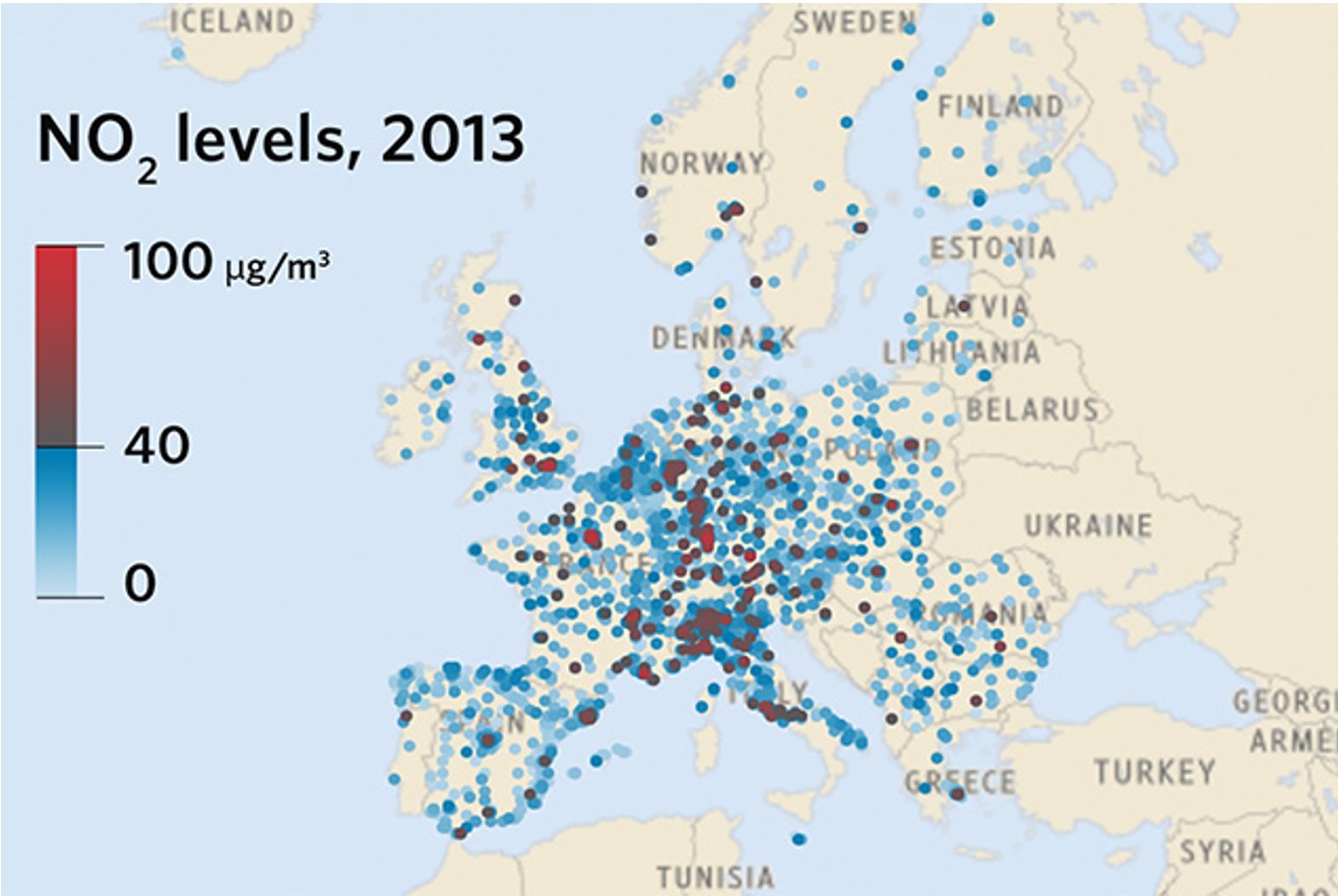Volkswagen Begins Recall of Dirty Diesel Cars in Europe
 |
| Where levels of diesel pollution are over the legal limit across Europe |
BERLIN— Volkswagen AG began recalling millions of tainted diesel-powered vehicles in Europe this week, but seems no closer to a deal with U.S. environmental officials over how to fix affected cars owned by American consumers.
Kicking off one of the largest product recalls in the history of the automotive industry—a fix that by the end of the year will encompass nearly 11 million diesel-powered vehicles world-wide—the German car maker began asking European owners of its Amarok light pickup trucks to bring their vehicles to a local dealer for the repair.
The move is a response to the disclosure last year by U.S. environmental authorities that Volkswagen rigged some of its diesel engines to cheat on tests for toxic tailpipe emissions. Regulators are forcing Volkswagen to fix the vehicles to make them compliant with existing emissions regulations. The company also faces billions of dollars in potential fines and consumer litigation.
Germany’s federal motor vehicle agency, or KBA, must separately approve the fix for each model affected. Once the KBA gives approval, a fix applies to vehicles across the European Union, not just in Germany. The KBA approved the Amarok recall on Wednesday and is expected to give the green light for the two-liter Passat as soon as next week.
“We expect the recall of the Passat to begin in early February and then there will be a cascade of models," a Volkswagen spokesman said. “We can’t do this all at once; we have to manage the workflow of the repair shops. It will keep us busy all year."
While Volkswagen is beginning to fix vehicles in Europe, talks are continuing with the Environmental Protection Agency and the California Air Resources Board, or CARB, over the recall of nearly 600,000 vehicles in the U.S.
Volkswagen says the repair of the vehicles in the U.S. is more complicated than fixing the same models in Europe because of different designs specific to each market.
The German auto maker has presented plans for installing a new catalytic converter in some U.S. diesel models, Chief Executive Matthias Muller said recently. But American authorities have yet to approve the plan. To encourage U.S. car owners to be patient while negotiations with regulators grind on, Volkswagen offered its U.S. customers a goodwill package worth more than $1,000 last year.
Volkswagen hasn't offered any compensation to European customers, angering European officials who want equal treatment for Volkswagen’s European customers. Volkswagen argues that it will fix the European vehicles faster and that the cash offer for American consumers is justified as a show of good will.
The fix in Europe is now under way and appears fairly simple. That is partly because U.S. restrictions on nitrogen oxides, which have been linked to fatal respiratory illnesses, are tougher than regulations in Europe.
The vehicles in the U.S. also use older emissions technology that cannot be fixed so easily. That is why Volkswagen wants to install a new catalytic converter in U.S. models. California environmental authorities rejected Volkswagen’s recall plan for the U.S. earlier this month, demanding more details on how the fix would affect the car’s performance, fuel economy, and emissions. The EPA supported CARB’s ruling.
Volkswagen said in December that its 1.2-liter and two-liter diesel engines could be fixed by updating the engine-control software, which will take about 30 minutes in the repair shop.
The fix for the 1.6-liter engine is more complicated. It, too, requires a software update to remove computer code that allows the vehicle to dupe emissions testers. But it also needs a hardware fix. Volkswagen said it must install what it calls a flow straightener tube, a kind of mesh screen that stabilizes air flow and allows the fuel-injection system to work more accurately. The repair will take about an hour.
Over the next few months in Europe, pending KBA approval, Volkswagen will begin recalling additional models, a company spokesman said. The recall of compact cars such as the Polo, which use a 1.2-liter engine, is expected to begin later this spring. By summer, Volkswagen expects to begin recalling cars that use its 1.6-liter TDI diesel engines, such as the Passat, Golf and Touran models. William Boston, The Wall Street Journal
